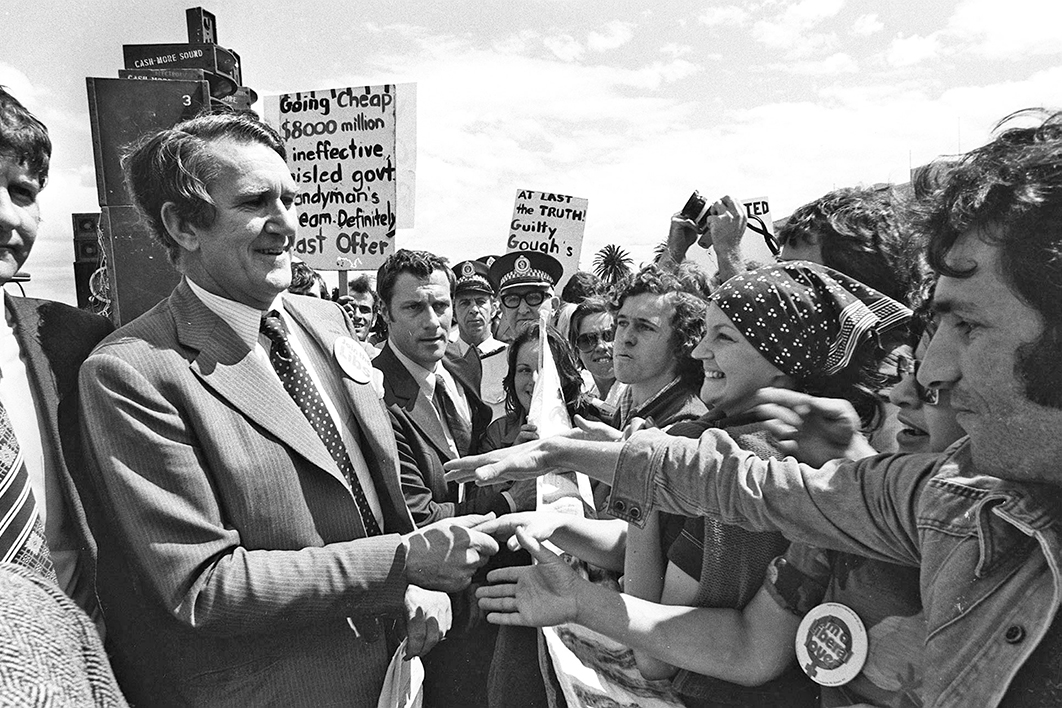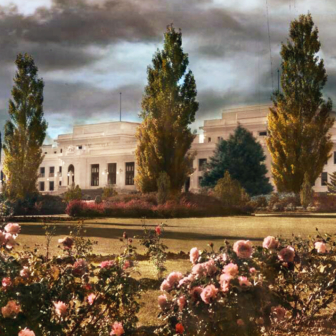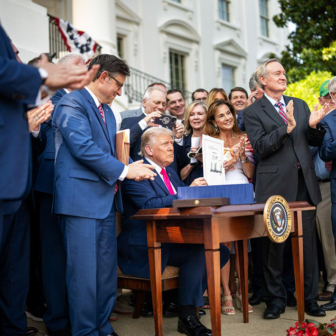At 9.55am on 11 November 1975, opposition leader Malcolm Fraser took a phone call from governor-general John Kerr, who opened the conversation by insisting it remain confidential.
Fraser was on the way to a joint party meeting. He grabbed the agenda, turned it over and took notes. What followed was one of the most momentous phone conversations in Australian political history. Kerr was signalling to Fraser that he would act that day to resolve the crisis brought on by the opposition parties’ decision to block the Whitlam government’s budget bills.
The piece of paper carrying Fraser’s notes is today in the University of Melbourne archives. It records the undertakings Kerr sought of Fraser before he dismissed Whitlam and installed Fraser as caretaker prime minister. There is a series of numbered points: “Double Dissolution Bills” — a commitment to announce an election; “Caretaker” and “No policy changes” — a promise to run a caretaker government; “Supply” — an undertaking to obtain supply immediately; and “Dissolution today” — the election was to be organised immediately.
All of those were positive commitments, and all came to pass. It is another point that seems the most extraordinary, viewed from the present day. This was an undertaking not to inquire into the activities of the Whitlam government, and particularly the infamous loans affair.
Fraser’s note is clear: “No Royal Commission.” In the book I co-wrote with him, Malcolm Fraser: The Political Memoirs, he recalled that his commitment to Kerr also precluded pursuing Whitlam through the courts or conducting any other kind of inquiry.
Fraser agreed to all this despite having denounced Whitlam as corrupt, despite allegations that Whitlam and his ministers had misled the governor-general, and despite the Labor cabinet having approved the raising of an enormous loan — equivalent to more than a quarter of total government income — by unconventional means, without the normal Loan Council approval and on the controversial advice of an attorney-general who had since been appointed a High Court judge.
True to Fraser’s word, there would be no court cases and no inquiries. By the standards of our time, this was extraordinary: today, the commissioning of inquiries by a new government into its predecessor has become, if not routine, then at least common.
The Albanese government has announced or proposed three inquiries into its predecessor. A royal commission will probe the robodebt scheme, later found to have been illegal by the Federal Court. A judicial inquiry will look into prime minister Scott Morrison’s decision to appoint himself to five extra ministerial portfolios without informing the affected ministers, cabinet or the public. And a foreshadowed inquiry will examine the previous government’s handling of the pandemic. The Independent Commission Against Corruption, due by Christmas, also looks likely to be given the power to inquire into the actions of previous governments.
Australia isn’t alone. From across the sea comes a whiff of sulphur as multiple inquiries, search warrants and court actions proceed, motivated by the actions of former US president Donald Trump. Whatever the merit of these probes, and whatever Trump’s culpability, they raise the possibility of a former president being jailed under the succeeding administration — and the risk that the United States might be seriously damaged by the resulting civil unrest. Some even speak of civil war.
Malcolm Fraser told me he was happy to give the commitment to Kerr. He believed it was wrong in principle for a government in a liberal democracy to investigate its predecessors. It was the kind of thing that happened in tin-pot dictatorships: one party, ascendant, would seek to jail its predecessors. “Democracy as we know it in Australia simply couldn’t survive if incoming governments developed the habit of prosecuting their predecessors,” he told me.
Fraser’s decision was also pragmatic. Amid the passions following the dismissal of the Whitlam government, a perception that he was pursuing Whitlam could tear the country apart. Senior public servants were threatening to resign if they were forced, against convention, to give the courts or inquiries access to the previous government’s documents and the advice it had received.
“Can you imagine how we would have looked, what people would have said, if we were seen to be pursuing Whitlam?” said Fraser. “And if public servants like the secretary of Treasury were resigning over it?”
Was Fraser right? Whatever we might think about the actions of the Morrison government, should we be worried that present-day governments seem increasingly keen to pursue their predecessors?
It wasn’t Albanese who started the trend. It was John Howard. His government appointed a royal commission into the 1993 lease to the Australian National Audit Office of Centenary House, a building owned by the Labor Party. The terms of the fifteen-year lease were so extravagantly in favour of the landlord that Howard, then in opposition, demanded an inquiry into the “rort.” Prime minister Paul Keating responded by setting up a royal commission that, amazingly, found nothing wrong.
Howard wasn’t satisfied. In 2004, now in government, he set up another royal commission. This one duly concluded that the original inquiry had been inadequate and the rent manifestly excessive. The commission found no evidence of corrupt conduct by Labor or any intervention by its ministers, and blamed lax and incompetent public servants. The consultants who negotiated on behalf of Labor did a good job, and the Commonwealth didn’t.
It was nine years before the next outbreak of inquiries into previous administrations. In 2013 another Coalition government, this time led by Tony Abbott, launched two royal commissions into the Rudd–Gillard Labor government, which had just lost office.
The first concerned the $2.8 billion home insulation program, part of the stimulus spending rolled out at top speed in the wake of the global financial crisis. Planning and prudence had been sacrificed for speed, and the environment department, ill-equipped to deal with such a large, complex program, had effectively outsourced safety. Four installers had died during the program.
The second of Abbott’s royal commissions was charged with investigating trade union governance and corruption, and is best remembered for delving into Julia Gillard’s long-ago relationship with a dodgy union official and cross-examining Bill Shorten about his time as head of the Australian Workers Union. It generated more heat than light. Forty people were referred to the authorities, but only one conviction resulted, while five other union officials either had their charges dropped or were found not guilty.
So how should we judge these inquiries, and the present crop?
I asked the opinions of three experts — A.J. Brown, who leads Griffith University’s integrity, leadership and public trust research program; legal scholar Kim Rubenstein of the University of Canberra, who was also an independent candidate for the ACT Senate in the last election; and political scientist Anne Tiernan, an adjunct professor at Griffith University.
There was much consensus. They agreed that such inquiries should concern systemic issues arising from the exercise of executive power and have clear potential to yield lessons for the future. The more the commissions were politicised, in either their creation or their processes, the more dangerous they could be.
Rubenstein put the current trend — and the need for a federal ICAC — in the context of a decline in the structures that might normally be expected to hold executive government to account. She nominated the politicisation of the Administrative Appeals Tribunal, which was designed to give citizens a recourse against government overreach, as a primary example. The new attorney-general, Mark Dreyfus, is reportedly considering abolishing and rebooting the AAT to get rid of a striking number of Liberal-linked members.
According to Rubenstein, other debased accountability mechanisms include the ombudsman, hamstrung by underfunding, and the Freedom of Information Act, the obligations of which governments are increasingly failing to observe. Added to that is the politicisation of the public service.
Perhaps ironically, the AAT, the ombudsman and the Freedom of Information Act were all initiatives of the Fraser government.
If all these structures had remained strong, said Rubenstein, a federal ICAC might not be needed. But she now believes that it is essential.
She supports ICAC having the power to look at previous governments. The principles it will embody — of proper conduct and honest administration — are not retrospectively applied recent inventions, but “principles that have always been there, being brought to bear by a new mechanism.” Therefore, inquiry into previous governments could well be justified.
The experts also agree that an inquiry into the management of Covid-19 is justified. Arguments can be had about its scope, but the pandemic response involved extraordinary exercise of executive power, and there are important lessons for the future functioning of the federal system.
The robodebt affair, on the other hand, has already been the subject of an ombudsman’s report and a Federal Court finding. What more can be learned?
Tiernan observed that royal commissions in recent times have evolved to become important platforms for victims of abuse and government overreach. “Often they’ve had to campaign long and hard to have them constituted — think institutional child abuse, banking or veteran suicides,” she said. “So they’re important in legitimising complaints and concerns about how power is exercised, often over those who lack power and resources, and affording them the respect they feel they’ve been denied. There is value in that.”
The robodebt royal commission might well fit into that class, Tiernan thinks. As well, she says, the government has a mandate to proceed because the inquiry was an election promise.
A.J. Brown put the robodebt inquiry into the same category as the pink batts royal commission — except he thinks robodebt probably involved worse abuses. When it was first proposed, he thought the pink batts royal commission was “hopelessly political” but he changed his mind. “As it turned out it helped add some genuine accountability and fleshed out a stronger picture of the lessons for avoiding similar policy failure in the future,” he said. As for robodebt, questions remain about “how something so bad was allowed to happen and keep happening and wasn’t rectified earlier.”
Brown hasn’t changed his mind, however, about the Abbott-initiated royal commission into the union movement. That was a “witch hunt” aimed at Gillard and Shorten in particular with that focus being “very clearly not justified in any way, shape or form from a public policy point of view.” Rubenstein pointed out that while unions might be powerful, they are not the executive government, and the events the royal commission investigated were historical — before Gillard or Shorten were in government.
All three experts supported the inquiry into Morrison’s multiple ministries. Brown said, “Given that you’ve got the solicitor-general saying, quite accurately, that this was completely inconsistent with fundamental constitutional principles of responsible government, and that everybody agrees with that, there is a clear public interest in knowing how the mistakes were made, assuming they were only mistakes, and what is needed to prevent them from happening again.”
Rubenstein and Brown both said the appointment of former High Court judge Virginia Bell, “a person of high standing,” adds to the integrity of the inquiry, given that the core issues are constitutional principle and practice. In Brown’s view, former Justice Dyson Heydon’s controversial decision to chair the union royal commission couldn’t be justified on those grounds.
If all the inquiries proposed by Albanese, and the creation of an ICAC with a retrospective scope are judged to be good things, how does Fraser’s 1975 decision stack up? The issues involved — huge amounts of money, the role of the governor-general, the bypassing of normal constitutional processes — were at least as grave as Morrison’s multiple ministries.
Fraser told me he had meant what he said when he described Whitlam as corrupt, but it was a political kind of corruption. “I believe they deliberately deceived the governor-general. They corrupted the political process, but they paid a political price.” The price was the loss of the 1975 election. After that, Fraser did everything he could to protect his predecessor from further action.
Not everyone agreed. Billy McMahon, a former Liberal prime minister, attempted to get around Fraser’s ban by organising for an obscure solicitor, Danny Sankey, to take a private action against Whitlam and his ministers. Fraser wanted attorney-general Bob Ellicott to take over the action and close it down, and their disagreement ended with Ellicott resigning — a loss Fraser deeply regretted.
The only lasting significance of the Sankey case was a High Court ruling that took a very narrow view of when a government can claim privilege over cabinet documents and withhold them from the courts. That ruling may well become relevant in the current round of inquiring.
But there was one thing Fraser didn’t nominate as a reason for eschewing inquiries into Whitlam — although it surely must have been on his (and Kerr’s) mind. If an inquiry had been held into the loans affair then the pressure for an inquiry into the governor-general’s dismissal of the Whitlam government, including his relationship with Fraser, would have been overwhelming.
And calls would then have come for an inquiry into the subsequently revealed attempts by Labor to use Iraqi loans to boost its campaign funds — with allegations surfacing years later that the KGB might have been involved.
On and on it would have gone. Would we have been the better for it? Or would it have amounted to a continuing crisis from which we might never have recovered?
Unanswered questions remain about these events, even all these years later, and despite the release of cabinet documents, the Palace Letters, memoirs by those involved, and academic and journalistic analyses and inquiries. Would a royal commission, with powers to question the players, have shed more light? We will never know.
Meanwhile, even if the currently proposed inquiries are justified and needed, the experts agree on the dangers of defeated governments routinely facing inquiries and litigation.
There can be no better argument for a reinvigoration of the normal accountability mechanisms that have fallen into such disrepair. And, of course, for principled leadership and a robust public service. •




